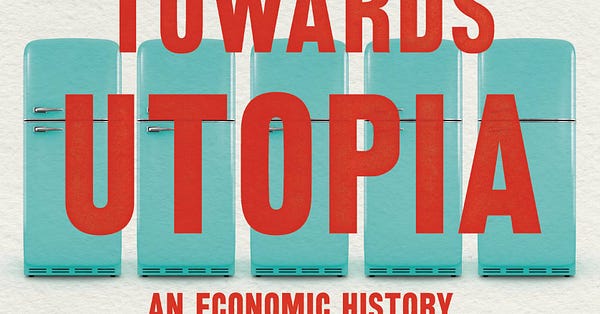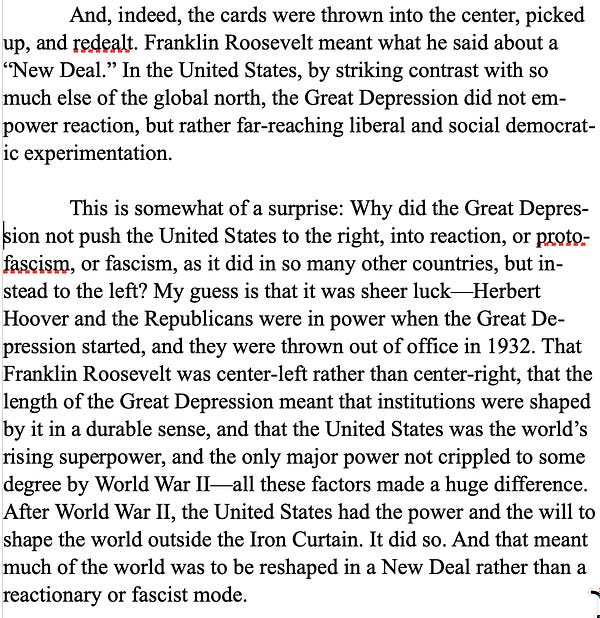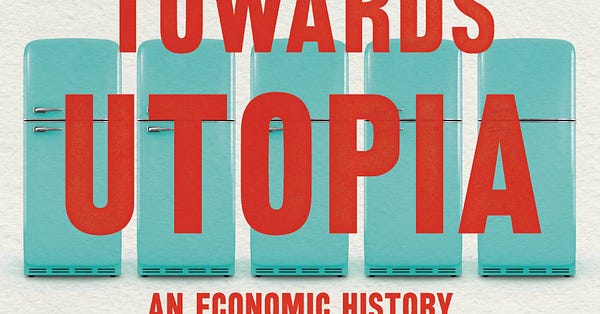CONDITION: 70F & Sunny:
First: The Unqualified-to-Opine-on-Anything John Cochrane
Sigh. It looks like it is time for some more intellectual garbage cleanup with respect to well-qualified (and extremely sharp) Fed Governor nominee-designate Lisa Cook, whom a bunch of Republicans have decided is a soft target. Because Black…




Damned if I can see why somebody who in November 2008 thought “we should have a recession. People who spend their lives pounding nails in Nevada need something else to do…” is qualified to opine on Federal Reseve personnel, or indeed on anything else.
For one thing, he was then under the false illusion that housing construction was then in some sense above trend, and we needed to shift labor out of construction to rebalance the economy. The structural adjustment had already been carried out over the previous 2 1/2 years, as construction spending had stood down and domestic consumer and equipment manufacturing had stood up, and has labor had flowed out of construction and into other sectors:
For another, he was then under the false illusion that structural adjustment is accomplished by pushing people out of low-social-value occupations into the zero-social-value occupation that is “being unemployed”. It is not. Structural adjustment is accomplished by pulling people into high-social-value occupations.
For a third, he has never, ever taken even small steps to attempt to mark any of his beliefs to market.
I have written about this before. Time to hoist it again:
Apropos of John Cochrane’s late-2008 declaration—”We should have a recession. People who spend their lives pounding nails in Nevada need something else to do…”. It was made at a time when the share of the U.S. labor force in construction was below its long-run average, and had been below its long-run average for fifteen months. It was made at a moment when the structural-adjustment climb-down from the housing boom had already taken place. And it was made with no recognition at all that structural adjustment takes place by pulling people into high-value jobs, not by pushing them out of low-value jobs into zero-value non-job
Cochrane’s remark was reported by John Lippert of Bloomberg. Cochrane took great exception:
I did not write this. It is an attribution, taken out of context, from a <http://bloomberg.com> article, written by a reporter with whom I spent about 10 hours patiently trying to explain some basics, and who also turned out only to be on a hunt for embarrassing quotes. Nevertheless, I was trying to explain how sectoral shifts contribute to unemployment. I never asserted that ‘it takes mass unemployment across the whole nation to get carpenters to move out of Nevada’…
Paul Krugman’s glossed on this as “[Cochrane claims] it takes mass unemployment across the whole nation to get carpenters to move out of Nevada…” That, to me, seems an eminently fair gloss on Cochrane’s ”We should have a recession. People who spend their lives pounding nails in Nevada need something else to do…” What else, in this context, could “We should have a recession…” possibly mean?
Yet, for Cochrane. being accurately quoted was some kind of vicious personal attack:
The level of personal attack in [Paul Krugman’s] New York Times article, and the fudging of the facts to achieve it, is simply amazing. As one little example, take my quotation about carpenters in Nevada. Krugman writes: ‘And Cochrane declares that high unemployment is actually good…. You cannot even dredge up an out-of-context quote for that monstrously made-up opinion
Let’s consider Cochrane’s claim that Bloomberg reporter John Lippert “turned out only to be on a hunt for embarrassing quotes”, that Cochrane “spent about 10 hours patiently trying to explain some basics”, and that Cochrane “did not write this. It is an attribution, taken out of context”. And Cochrane implies the context was him patiently explaining things to a reporter.
Cochrane’s implication is false. It was not in a private conversation with a reporter. It was the thesis of Cochrane’s 2008 CRISP Forum Keynote Address. Scott Gosnell reports:
I was there. I may even have a recording down in the archives and may have sprained my eyes I rolled them so hard…. I went to all of those econ talks at Gleacher while I lived in Chicago. The noticeable thing about Cochrane was that he was very good at financial economics, but fell apart when he tried to jump to macro. But of course faculty could say all kinds of things without getting much skepticism. Being a Mellon-style liquidationist was sort of edgy and cool among the Republican-leaning economists at the time…. Where before, Austrian economics would get you a glance askance, in 2008, it would get you a $300+ bottle of wine at dinner with Paul Ryan.
The kind and gracious John Lippert tells a very different story than Cochrane about where the quote came from, and asserts that it is in context, and is a direct quotation, not “an attribution”, whatever that might mean:
Hi Professor DeLong:
Thanks for your note. Professor Cochrane’s complaint [about my story] is something of which I became aware several months after we published our story in 2008....
The bottom line is that Bloomberg did not respond to Cochrane’s comments. He never sent them to us, despite my request that he do so. When we became aware of his complaint, we saw no reason to make a correction. Cochrane made the ‘pounding nails’ comment at a Chicago Booth forum at the Gleacher Center in downtown Chicago in November 2008. It was part of an ongoing lecture series, as I recall. It was kind of a big event, with a couple hundred people. So they may have a recording that you can access.
Good luck with your inquiries.
Tks,
John Lippert
I have been unable to get a copy of the recording from the Gleacher Center at the University of Chicago…
One Video:
George Magnus: Red Flags: Why Xi’s China is in Jeopardy <https://www.youtube.com/watch?v=IBWPWM1vol4>:
One Picture:
Very Briefly Noted:
Matthew Yglesias: Can America Get to Yes on a New Reactor Design?: ‘Everyone says they want the NRC to approve advanced nuclear reactors, but it keeps not happening… LINK:
Michael Harriot: MLK Is Revered Today but the Real King Would Make White People Uncomfortable: ‘Martin Luther King Jr was a walking, talking example of everything this country despises about the quest for Black liberation… <https://www.theguardian.com/commentisfree/2022/jan/17/mlk-is-revered-today-but-the-real-king-would-make-white-people-uncomfortable>
Jason Zweig: How a Flood of Money Swamped Cathie Wood’s ARK: ‘The ARK Innovation ETF posted big returns, and big money followed. Now it’s the latest example of what happens when a fund becomes too large for its own good… <https://www.wsj.com/articles/cathie-wood-ark-innovation-performance-11642175833>
Lauren Goode: iMessage Is the Glue that Keeps Me Stuck to the iPhone: ‘The accidental social network… <https://www.theverge.com/2016/10/10/13225514/apple-iphone-cant-switch-pixel-android-imessage-addiction>
From Twitter:
Brad DeLong: ’Slouching Towards Utopia: An Economic History of the 20th Century". Forthcoming from Basic Books on September 6, 2022. 68th Sentence <https://t.co/bRKJD7ruJy>: "So throughout the long twentieth century, communities and people looked at what the market economy was delivering to them and said: ’Did we order that?’”. That last reference is to Nobel Prize-winning physicist I.I. Rabi’s quip in response to the identification of the muon—an elementary particle that seemed then to be nothing other than a much heavier version of the electron…


Brad DeLong: ’Massachusetts-style American nationalism is this: We have come from all the corners of the earth to this New World to build, together, a Godly utopia, of which all fleeing the troubles and oppressions of the Old World can have their share, and we will be as a City Upon a Hill, a Light Unto the Nations. Kentucky-style American nationalism is…

Brad DeLong: ’Yes. Keynes’s peroration in his 1938 letter is quite something. Addressed to FDR: "Private and personal: Dear Mr. President…. Finally, the railroads… potential sources of substantial demand for new capital expenditure, Whether hereafter they are… <

Brad DeLong: ’The bottom line: the later you abandon the Gold Standard, and the less enthusiastic you are about a real New Deal—having the government print money and borrow and buy stuff—the worse you do in the Great Depression. 13/END" / Twitter_: ‘The earlier you abandon the Gold Standard and start your New Deal—and the more comprehensive and aggressive your New Deal is in terms of the government printing money and borrowing and buying stuff—the better. In Japan, Takahashi Korikiyu threw the Gold Standard over the…

Brad DeLong: ’The next 7.5 months until my book comes out are going to be very, very, very hard for me… If Al Smith & FDR had won the presidency in 1928, they would have been thrown out in 1932 by Americans outraged at how the Democrats botched the economy…


Brad DeLong: ’Ummmm… Automobiles? Only Elon Musk has been out there trying to pay money to buy more chips and figure out how to use them to make cars? Everyone else has been sitting on their hands, saying: we are missing a $10 part, so we cannot make a $40,000 car! Smells very much like concentration-enabled cartel action to me…. Paul Krugman: "True, few economists believe that monopoly power has been a big cause of recent inflation…

Brad DeLong: ’That is… not right. If you had an idea that seemed half-plausible that might help cure the Great Depression, FDR would listen to it, try it, and then attempt to reinforce success and cut short failure. Since those he listened to were his fellow progressives, and since… 1/" / Twitter_: ‘That is… not right. If you had an idea that seemed half-plausible that might help cure the Great Depression, FDR would listen to it, try it, and then attempt to reinforce success and cut short failure…

Brad DeLong: ’“Slouching Towards Utopia”…. Forthcoming from Basic Books on September 6, 2022. 65th–67th Sentences https://t.co/bRKJD7ruJy: "But people think they have other rights [than property rights…


Paragraphs:
Ben Thompson: The Intel Split: ‘One of my favorite quotes from Michael Malone’s The Intel Trinity is about how “Moore’s Law”… was not a law, but a choice: “…a social compact, an agreement between the semiconductor industry and the rest of the world that the former will continue to strive to maintain the trajectory of the law as long as possible, and the latter will pay for the fruits of this breakneck pace. Moore’s Law has worked not because it is intrinsic to semiconductor technology. On the contrary, if tomorrow morning the world’s great chip companies were to agree to stop advancing the technology, Moore’s Law would be repealed by tomorrow evening, leaving the next few decades with the task of mopping up all of its implications.” Moore made that observation in 1965, and for the next 50 years that choice fell to Intel to make. One of the chief decision-makers was a young man in his 20s named Patrick Gelsinger. Gelsinger joined Intel straight out of high school, and worked on the team developing the 286 processor while studying electrical engineering at Stanford; he was the 4th lead for the 386 while completing his Masters. After he graduated Gelsinger became the lead of the 486 project; he was only 25…
LINK: <https://stratechery.com/2022/the-intel-split/>
Debby Wu: Chipmakers Are Outspending Governments: ‘In early January, Florida unveiled a $9.7 million program to boost state infrastructure and train future semiconductor engineers in the hope of attracting chip manufacturers to the Sunshine State. The laudable initiative was off by a few orders of magnitude in its estimation of the cost…. Taiwan Semiconductor Manufacturing Co. is set to spend over $40 billion on capex this year alone. Intel… more than $25 billion in 2022…. Samsung… is on a multiyear spending spree totaling more than $100 billion…. TSMC’s $12 billion fab under development in Arizona got a boost from Phoenix authorities, which agreed to provide about $200 million to develop roads, sewers and other infrastructure. Samsung’s $17 billion Texas plant is also likely to win some U.S. federal incentives that may net it billions. If Florida really wants in on that hotly contested action, it’ll have to be significantly more generous…. Japan is offering $6.8 billion in incentives to lure global chipmakers to the country and India is allocating $10 billion over six years for the development of a local semiconductor industry. The U.S. may be prepared to come up with a more bountiful $52 billion to bolster its domestic chip industry, but the Biden administration is still struggling to get that approved, and that amount is expected to be split among several companies. And none of these countries are buying the very latest and best technology with their proposed subsidies and support. At least 70% of TSMC’s massive spending in 2022 is devoted to cutting-edge fabrication and capacity, meaning the majority of the budget will be used to improve facilities at home in Taiwan, where the company still makes the most advanced chips…
Jérémie Cohen-Setton & al.: Supply-Side Policies in the Depression: Evidence from France: ‘The effects of supply-side policies in depressed economies are controversial. We shed light on this debate using evidence from France in the 1930s. In 1936, France departed from the gold standard and implemented large-scale mandatory wage increases and hours restrictions. This quickly ended deflation, but output stagnated. We present time-series and cross-sectional evidence that the supply-side policies, in particular the 40-hour law, contributed to French stagflation. These results are inconsistent both with the standard one-sector new Keynesian model and with a two-sector model calibrated to match our cross-sectional estimates. We propose an alternative, disequilibrium model consistent with expansionary effects of lower real interest rates and contractionary effects of higher real wages. This model and our empirical evidence suggest that without supply-side problems, France would have recovered rapidly after leaving the gold standard…
LINK: <http://www-personal.umich.edu/~hausmanj/Cohen_Setton_Hausman_Wieland.pdf>
Josh Barro: Today in the Mayonnaise Clinic: How to Have Useful Conversations: ‘It’s my job, so let me tell you how I approach it…. The show is a success if it informs or persuades. To inform or persuade, the guests have to have disagreements with each other and the audience, they have to understand where the other side is coming from, and they have to approach that gap in good faith…. You need to have a disagreement over an issue that matters…. You need to discuss the actual nexus of the disagreement in good faith. Unfortunately, during the Trump era, it was very challenging to achieve both this bullet and the prior one. Trump took the Republican Party with him but got a surprisingly small fraction of the conservative commentariat. The anti-Trump rump has gotten airtime vastly disproportionate to its influence, but most of the pro-Trump pundits are full of shit. It’s a huge problem for the discussion format (and it has been for seven years)…. Choose topics and panelists that allow you to achieve both of these goals…. Pick panelists who have something interesting to say about the topics you’ve chosen…. Remember you’re at work and the show is a work product…. Don’t book assholes…
LINK:
PAID SUBSCRIBER ONLY Content Below:
One of the highest-subscription ‘Stacks is:
Tipping Point Quick Hits: ‘Israel prepares for Iran, NASA considers alien contact, and a Temple dye is restored…. The incoming commander of the Israel Air Force (IAF) told The Jerusalem Post that Israel was prepared—right now—to strike Iran’s nuclear program. Major-General Tomer Bar will officially take command of the IAF in April…. When asked if he thinks Israel can successfully destroy Iran’s nuclear facilities, Bar stressed that “there is no way that we will operate there, one thousand kilometers from here, and I will return home without being able to say ‘I completed the mission.’” It’s noteworthy that Israel’s military leaders are now referring to the potential of a strike at any moment, and assuming that it will happen soon. I have written before, of course, that a preemptive strike from Israel could be the match that sparks the Gog-Magog War. Interestingly, Bar seems to indicate that he understands hitting Iran won’t be the end of a solitary nation-to-nation conflict, but the beginning of a broader one involving multiple groups…
LINK:
Back in Genesis 10 there is a guy named Magog. He is the author of a tribe of people, and thus, eventually, a nation, Magog, for it is standard in the Hebrew Bible to refer to peoples by the name of their eponymous ancestor.
By the time Ezekiel is prophesying, in Ezekiel 38, Magog is a land, and Gog is the Prince of Magog:
Son of man, direct your face against Gog, of the land of Magog, the prince, leader of Meshech and Tubal, and prophesy concerning him. Say: Thus said the Lord: Behold, I am against you, Gog, the prince, leader of Meshech and Tubal...
But later writers do not appear to have copies of the Book of Ezekiel handy. They relied on their memory, which played them false. They turned “Gog from Magog” to “Gog and Magog”. And so we have John the Theologian on the island of Patmos:
When the thousand years are over, Satan will be released from his prison and will go out to deceive the nations in the four corners of the Earth—Gog and Magog—and to gather them for battle. In number they are like the sand on the seashore…
Ronald Reagan appears to have been one of those who thought “leader of Meshech” in Hebrew—rosh Meshek—was “Russia Moscow”. And French leaks report the rumor that George W. Bush told Jacques Chirac about Gog and Magog back before he launched the attack on Iraq back in 2003.
Yet somehow confidence in prophecy is not dented by the fact that somewhere on the line there was static: either the divinely inspired Ezekiel misheard the message, and transformed the nation of Gog into a person “of the land of Magog, the prince, leader of Meshech and Tubal…” or John of Patmos and his posse simply did not have a good enough memory to accurately recall the Ezekiel verses they were adapting for their own address to the Seven Congregations of Asia Minor, the message of which is: “Hunker down! Don’t try to smite our enemies! For soon God will smite our enemies in a way that will gladden your heart beyond your wildest imaginings!”
The theology of that message, of course, does not sound very Christian to me. But the most deeply disturbing thing is people eager for a war that will kill hundreds of thousands or more, because they think God has willed it, based on two written-down prophecies… at least one of which has to be wrong.












And a description of the Chicago Plan of 1933.
I better see Henry Simons in that book.